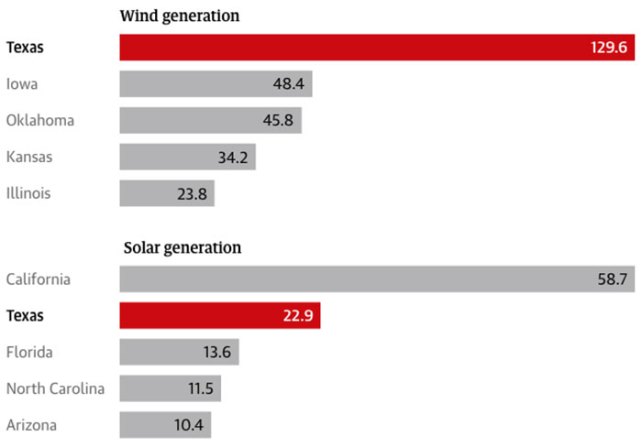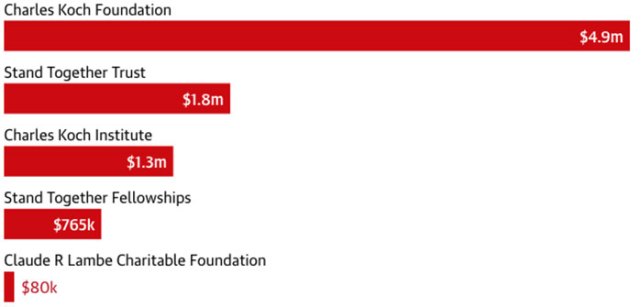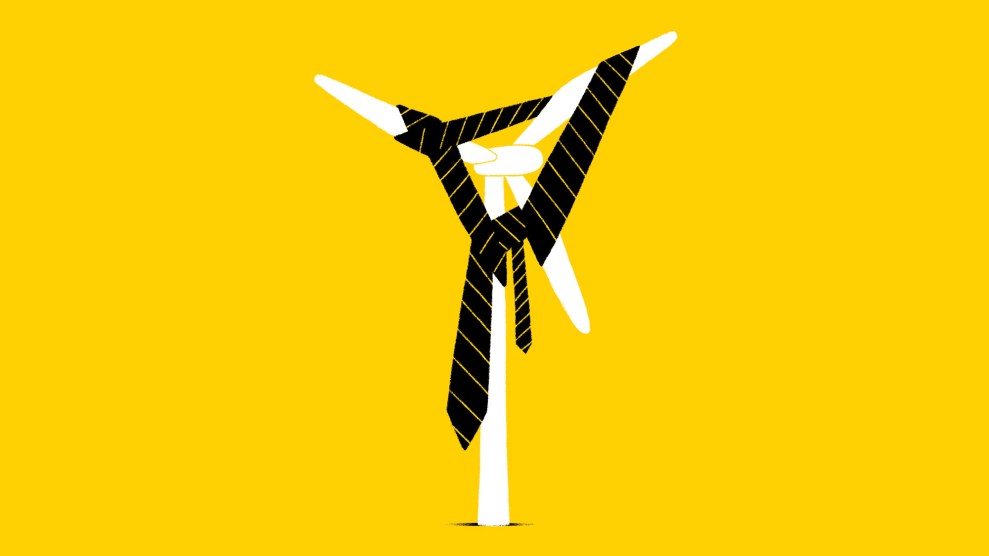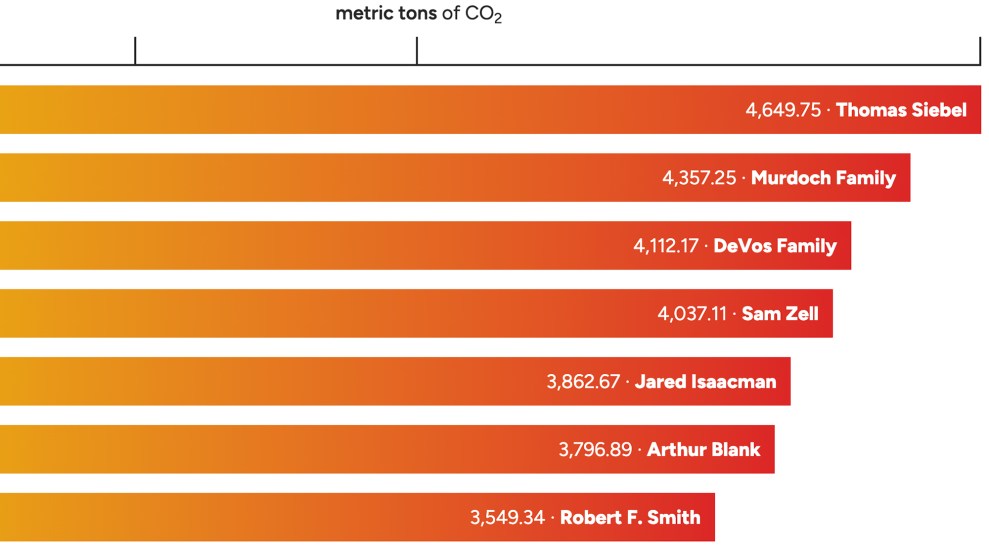
Charles Koch's foundation has donated nearly $5 million to the TPPF.David Zalubowski/AP
This story was originally published by the Guardian and is reproduced here as part of the Climate Desk collaboration.
In the scramble before the recent end of Texas’s legislative session, a must-pass bill was amended to impose new costs upon renewable energy. This came amid a barrage of anti-solar and wind power measures pushed forward by Republicans to reshape a state that has become the US’s powerhouse of clean energy.
But the conservative lawmakers had help.
Sections of the bill that impose new burdens upon clean energy providers were directly crafted and edited by the Texas Public Policy Foundation (TPPF), a conservative group that has led the backlash to renewables and to make what it calls “the moral case for fossil fuels,” according to a copy of the draft language seen by the Guardian.
Several dozen edits were made to the bill’s amendments by Brent Bennett, a TPPF policy staffer, the document shows, and Texas lawmakers subsequently passed parts of this language along with the key TPPF desires—to impose new transmission costs on renewables and require them to source fossil fuel “backup” power when the sun isn’t shining or wind isn’t blowing.
The passage of the bill, which funds the ongoing operation of the Public Utility Commission of Texas, was the flagship victory for TPPF even as a raft of other Republican bills that would have “shut down the renewable energy industry in Texas,” as energy analyst Doug Lewin put it, faltered.
The burgeoning influence of TPPF, an organization substantially funded by fossil fuel interests and publicly lauded by Greg Abbott, Texas’s Republican governor, is the catalyst to a rightwing attempt to crimp the stunning progress of renewable energy in the state, which now produces more than a quarter of all wind-powered electricity in the US.
The group’s agenda is now extending far beyond Texas, bankrolling efforts to halt offshore wind turbines in Massachusetts and to prop up coal power on native American land in Arizona while spearheading efforts to crack down on sustainable finance in energy-producing states like West Virginia.
“We are very influential, we are meeting with policymakers to share recommendations and we’re having success around the country,” said Jason Isaac, a former state representative and now director of TPPF’s energy initiatives. Isaac said that TPFF regularly helped craft “certain aspects” of bills in Texas related to the state’s electricity grid or environmental, social, and corporate governance (ESG) issues.
“I think conservatives are slowly but surely moving away from variable generation and towards reliable generation,” he said of the group’s quest against renewables. Isaac claimed renewables have been unfairly propped up by a “cult-like fascination” among politicians who have pursued what he called a “dangerous and deadly” agenda to reduce planet-heating emissions.
Texas is a leading source of renewable electricity generation
Top five generating states in 2022 (in millions of megawatt-hours)

The aggressive push against renewables in Texas has alarmed environmentalists who fret it will undermine the state’s nation-leading wind industry and threaten the revenues solar and wind generates for local communities and farmers. More broadly, the template used by TPPF in Texas could hobble efforts by Joe Biden’s administration to tackle the climate crisis.
“We are seeing a rush of these bills attempting to wind the clock back on renewables and TPPF really are at the point of the spear on this,” said Luke Metzger, executive director of Environment Texas. “They are transparent advocates for the fossil fuel industry and I think they pose an incredible threat to renewables. TPPF have gained incredible traction, they really are shifting the narrative in Texas.”
“They’ve won over the top politicians in the state, which is very dangerous. Texas is going to be critical if the US going to get to net zero emissions, so we should take this threat seriously.”
TPPF’s impact can now be found thousands of miles from its base in Austin, Texas, with the group filing a lawsuit in 2021 on behalf of six east coast fishing businesses—collectively called Nantucket Residents Against Turbines—targeting a major windfarm currently under construction off the coast of Massachusetts. Slated to come online by the end of the year, Vineyard Wind will be the first major offshore wind project to be built off the East Coast.
The lawsuit claimed federal agencies did not sufficiently analyze how the project, which is set to deliver enough electricity to power 400,000 homes, would affect wildlife—specifically the endangered North Atlantic right whale—and thereby violated the Endangered Species Act and slew of other environmental policies.
Meghan Lapp, a seafood dealer and longtime offshore wind critic who was a plaintiff in the suit, told Reuters in 2021 that TPPF got involved in the suit at her request. As it announced its involvement in the case, the thinktank also took the unusual step of releasing a trailer called “A Heavy Wind.”
The case was ultimately unsuccessful after a federal judge dismissed it last month, but the idea that wind turbines kill whales has been seized upon by conservatives, especially since December, when dozens of whales began washing up on the Atlantic coast in what the National Oceanic and Atmospheric Administration (NOAA) calls an “unusual mortality event.”
NOAA has said there is no evidence that offshore wind power is killing off whales, with fishing practices, boat strikes, and the climate crisis among the primary dangers to marine mammals, but congressional Republicans have called on the White House to pause offshore wind development, while Tucker Carlson, then of Fox News, aired a critical series of segments called “The Biden Whale Extinction.”
The assault on renewables by TPPF and its Republican allies has stunned conservatives who remain supportive of the longstanding bipartisan enthusiasm for clean energy.
The reversal has been particularly stark for Texas which, blessed with the capacious, flat terrain and amenable climate for abundant wind and solar energy, was championed as a bastion for renewables by previous Republican governors George W Bush and Rick Perry, even as they embraced the ubiquitous oil industry.
More than 40 percent of Texas’s electricity came from carbon-free sources last year, with the state now producing more wind and solar than the next three states—California, Iowa and Oklahoma—combined. This imperious status now seems uncertain.
“I don’t recognize the state sometimes any more from our elected leaders. It’s like we are in a twilight zone where up is down and day is night,” said Matt Welch, state director of Conservative Texans for Energy Innovation. “I fear we’re losing our lead in the nation and the world as the source for clean energy advancement. It’s just amazing we’ve rolled up the welcome mat and told wind and solar operators they’re just not welcome here any more.”
The Texas Public Policy Foundation was founded in 1989 by James R Leininger, a San Antonio-based physician who made his fortune selling hospital beds, and initially focused on the issue of charter schools before branching out into other topics such as energy. The thinktank is a member of the State Policy Network, a network of far-right nonprofits across the country that fight climate-focused legislation.
In 2021, the most recent year for which records are available, donations for the thinktank totaled $25.6 million. Publicly available data shows that—like many State Policy Network affiliates—its largest known funder is Charles Koch, the billionaire industrialist who made his fortune from fossil fuels. Entities tied to Koch have contributed at least $8.8 million to the group since 2012, according to an analysis by researcher Connor Gibson.
Koch-linked groups donated at least $8.8 million to TPPF
Donations from 2012-2020

Tax filings show that the group has received donations from fossil fuel companies including ExxonMobil, ConocoPhillips and Chevron, but, as a nonprofit, the full extent of TPPF’s fossil fuel funding is unknown.
Issac said, however, it has been “many years” since large oil firms such as Exxon have donated to TPPF as these companies now ostensibly support decarbonization and environmentally responsible corporate governance, which conflicts with the foundation. He insisted that the foundation is committed to “free enterprise and individual liberty” and the eradication of “market distorting” subsidies, not just for renewables but also fossil fuels.
But Welch said that Republican lawmakers, backed by TPPF, have ditched any ideological consistency by heaping onerous restrictions on renewable energy development on private property, in some cases attempting to impose requirements absent from oil and gas drilling, and trying to slash subsidies for the industry at the same time as offering state support for the buildout of new gas plants.
One proposed bill that didn’t get sufficient backing in the latest Texas legislative session would have placed stringent new rules for wind and solar projects, including written permissions from neighboring property owners and setbacks of up to half a mile from the edge of a property for wind turbines. Another would have cut all subsidies for renewable energy.
“On a Tuesday these lawmakers will be adamantly for private property rights, but on a Thursday they will want to stop the growth of renewable energy even though it’s on somebody’s private land,” Welch said, adding that TPPF was full of “mini Milton Friedmans for years, until recently, and now all of a sudden they throw that out the window.”
“It’s been a shocker. It’s so hypocritical,” he said. “I used to be an acolyte of TPPF but they are now driven by oil and gas billionaires who want to stop alternative forms of energy to benefit their own bottom line. They’ve sold their soul to the almighty dollar.”
Renewable energy remains broadly popular with the Texas public for delivering cheap, clean power along with an injection of cash for entities such as school districts, but affection has somewhat curdled among some of the state’s Republican leadership. A devastating winter storm in 2021, which left millions of Texans without power and led to several hundred deaths, was a major accelerant of this trend.
In the days following the crippling event, known as winter storm Uri, Abbott and other leading Republicans pushed the blame for the power blackouts upon renewable energy, with misleading pictures of frozen wind turbines from Europe quickly circulating social media as the supposed cause of the grid’s breakdown.
Subsequent studies have made clear the primary cause of the blackouts were frozen gas pipelines and a lack of infrastructure resiliency to extreme weather, rather than renewables per se, but the perception of faulty wind and solar has stuck, eagerly fanned by TPPF. “I still believe [renewables] deserve a lot of the blame,” said Isaac. “The storm was helpful in educating people who just assumed when they flip a switch the lights come on that there are issues with grid reliability, that solar panels covered in snow don’t produce electricity.”
Isaac said the foundation accepts that the climate is changing but disputes that this is harmful to people, claiming that the benefits of burning of fossil fuels “far outweighs” any negatives, including deadly air pollution, which he asserts isn’t an issue for the US and its “near natural” air quality. Scientists have, in fact, found that the climate crisis poses huge and growing risks to humanity, with airborne pollutants from burning coal, oil and gas linked to an array of different health problems.
While the most severe of the anti-renewables bills pushed forward in Texas didn’t pass the legislature this year, Isaac said that TPPF remains undaunted and will continue to agitate against what he called “the false panacea of variable power.” Supporters of clean energy said they expect further battles ahead to prevent Texas’s progress in solar and wind from being unwound.
“With the growth trajectory of renewable energy, TPPF can either get on the train or lay down in front of the tracks,” said Welch. “I suspect they won’t rest on their laurels. They’re going to come for renewables again and again and again.”

















